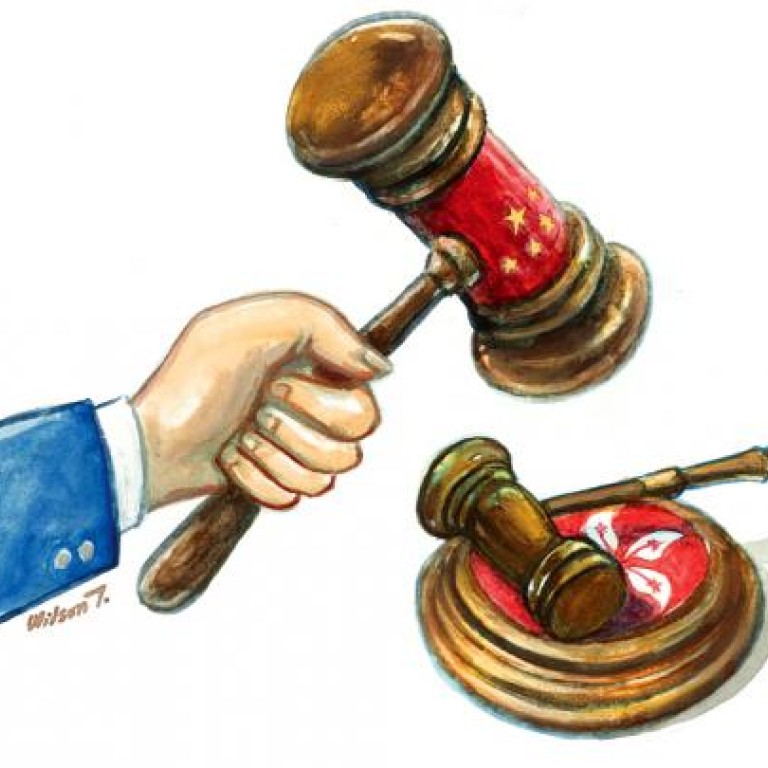
An NPC interpretation is not the answer to Hong Kong's immigration problems
Michael Davis says by suggesting the Court of Final Appeal could seek an interpretation of our immigration law, the government risks undermining Hong Kong's autonomy
Eleven years after the unanimous Court of Final Appeal decision in the Chong Fung-yuen case granting Hong Kong residency to children born in Hong Kong of mainland parents, and more than 196,000 such births later, the government has made its most comprehensive move yet to address our overcrowded maternity wards and the follow-on surge in school enrolment.
Last week, in the right of abode case brought by domestic helper Evangeline Banao Vallejos, the government suggested to the top court that it could refer Article 24 of the Basic Law, relating to Hong Kong permanent residency, to the National People's Congress Standing Committee for interpretation. The government invoked Basic Law Article 158, which provides for such referral for Basic Law interpretations on matters of central responsibility or local-central relations.
In seeking the referral, Secretary for Justice Rimsky Yuen Kwok-keung appears to be aiming to solve two problems in one go - mainland births and the domestic helper residency issue. But it may be that Hong Kong's autonomy and rule of law suffer as a result, as the government is putting the top court in a no-win situation.
First, it is important to note that the case of mainland mothers giving birth in Hong Kong is not now before the Court of Final Appeal. Rather, the domestic helper case is. Since the top court has long held that immigration - under Article 24 - falls under Hong Kong's autonomous control, one would assume that the residency of foreign domestic helpers is a local issue.
When the Chong Fung-yuen case was before the top court in 2001, such referral of Article 24 (1) was refused by the court. It concluded that the residency issue did not fall under the Article 158 excluded provisions concerning matters of central responsibility or local-central relations.
In asking the top court to overrule itself and seek a "clarification" of the entire Article 24, well beyond the limited sub- section before the court, the government appears to be seeking an amendment of Article 24 in the guise of interpretation.
In deciding the Chong Fung-yuen case on its merits, the court followed the clear language of Basic Law Article 24 (1), which lists Hong Kong permanent residence to include: "Chinese citizens born in Hong Kong before or after the establishment of the Hong Kong Special Administrative Region."
At the time, even the government agreed that a 1996 Preparatory Committee opinion that sought to add the requirement of Hong Kong residency of at least one parent of such Chinese citizens was not binding on the court. That opinion was issued long after the Basic Law was drafted and would not be relevant in common law to its interpretation. The government had agreed that the invocation of it in a 1999 NPC Standing Committee interpretation did not make it binding generally as part of the interpretation. The government has now seemingly changed its mind.
In the Chong Fung-yuen case, the Court of Final Appeal essentially held that it was bound under the common law to apply the clear meaning of Article 24 and not look for some hidden intent of the drafters. It declined to amend this clear language in the guise of interpretation.
The government's move now leaves the top court with no good alternative. If the court succumbs to government pressure and refers the matter, then it will be reducing the scope of Hong Kong's autonomy and opening the door to refer more and more Basic Law interpretation issues to the NPC Standing Committee, a non-judicial body which may take liberties with the Basic Law text. The Standing Committee would be asked to offer an interpretation of the entire Article 24 that the text of the Basic Law will not bear, and will thereby be effectively amending the Basic Law without following the proper procedures.
A preferable choice would be for the court to continue to uphold its well- reasoned, principled and unanimous decision in the Chong Fung-yuen case. But this risks the government going over its head and directly referring the matter to the NPC Standing Committee, effectively overruling the Court of Final Appeal as it did in the Ng Ka-ling case. The government should be mindful of its role in defending the Hong Kong legal system.
The normal route in an autonomous common law jurisdiction would be to carry out the decision of the Court of Final Appeal unless such a decision was overruled or a legal way around the decision could be derived.
So far, the government appears to have taken a short cut. If it thought the burden of Article 24 (1), as interpreted in the Chong Fung-yuen case, was too onerous, it could have proposed legislation to restrict completely or partially the entry of mainland mothers-to-be into Hong Kong for baby delivery, or it could have passed legislation that imposed conditions of sustained residence for children who attain such right of abode. Such should be guided by appropriate population and public health policy.
Either of these policy routes would be reasonably defensible in a subsequent challenge before the top court.
A third alternative would be the move suggested by some democrats of amending the Basic Law. We have not seen the advice given to the government, but it appears that the most influential advice may have been aimed more at enhancing the role of the NPC Standing Committee rather than the courts and the rule of law.

